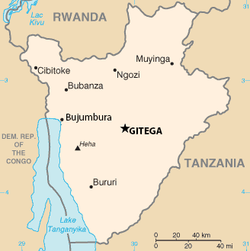Press freedom groups condemn two-day radio station ban in Burundi
Wednesday, July 20, 2005

One of Burundi's only independent radio stations, Radio Publique Africain, has been taken off air for two days. Last week the country's National Communications Council (CNC) ordered the radio station to stop broadcasting indefinitely, claiming that it had insulted them, and that coverage of recent elections had been biased.
RPA director Alexis Sinduhije said that the claims were unjust, and that the station had given every political party 20 minutes airtime a week during the elections.
But he reluctantly agreed to a two-day ban after mediation by a group of professional journalists and private broadcasters between RPA and the CNC.
Earlier this year, Radio Publique Africain was suspended for two days after being accused of breaking the country's press laws, including "offending public morals", by reporting on the rape of an eight-year-old girl and "deforming" the words of a politician. RPA observed the ban and was allowed to restart broadcasting afterwards.
The ban has been condemned by the international press freedom organisation the Committee to Protect Journalists, who have called on the CNC to lift it "immediately and unconditionally"
A group of Burundian journalists overseas, the "Collectif des Professionnels des Médias de la Diaspora Burundaise" has also spoken out, in an open letter to the CNC, accusing it of being "a body of repression which uses disproportionate sanctions".
Burundi's recent democratic elections were the first since the 1993 assassination of President Melchior Ndadaye plunged the country into a vicious, ethnically-charged civil war.
"Press freedom has been historically related to the emergence of democracy", the letter continues. "It is essential that the media, like other instruments of good governance, is protected".
Radio Publique Africain was launched in early 2001, seeking to promote peace by hiring both Hutus and Tutsis, including ex-combatants, to work on the editorial team. The station's investigative reporting and grassroots approach to issues affecting ordinary Burundians quickly earned it the nickname "the People's Radio."
"We ask the political leaders to answer their concerns: Why are people kept in prison without trial? Why has their land been taken away? Exposing the truth in this way has brought Hutu and Tutsi communities together and made it harder for politicians to manipulate the public", said RPA director Alexis Sinduhije after receiving a press freedom award last year.
In October 2001 Sinduhije was arrested and beaten up after interviewing a South African peacekeeper against the wishes of the Burundian government. In February 2003 armed men broke into Sinduhije's house and murdered his security guard. In September of the same year Radio Publique Africain was taken off the air after broadcasting an interview with a rebel spokesperson. In a show of solidarity, other independent radio stations refused to broadcast any government news or statements until the ban on RPA was lifted.
Burundi's independent media has become increasingly vocal and vibrant in recent years. The development of the internet has seen the appearance of a number of independent Burundian news websites based overseas, outside the control of Burundi's government and the CNC. When the radio journalist Etienne Ndikuriyo was arrested without charge earlier this year, the Burundian online media helped mobilise international opinion, and he was released eight days later.
Sources
edit- "Police shutter independent radio station" — International Freedom of Expression Exchange, July 22, 2005
- "Banned independent radio station stops broadcasts for two days" — Committee to Protect Journalists, July 19, 2005
- "Press under attack again in Burundi" — Campaign for the prosecution of Agathon Rwasa, July 20, 2005
- "Lettre ouverte au Président du Conseil National de la Communication (CNC)" — Collectif des Professionnels des Médias de la Diaspora Burundaise, July 18, 2005
- "CPJ International Press Freedom Awards 2004 - Alexis Sinduhije" — Committee to Protect Journalists, October 14, 2004
- "Director of private radio station arrested and beaten" — International Freedom of Expression Exchange, October 22, 2001
- "Burundi: Journalists subjected to constant attacks" — Amnesty International, February 20, 2003
- "Les professionnels exigent la libération du journaliste Ndikuriyo" — www.umoco.com, June 15, 2005
- "Petition contre la suspension de la Radio Publique Africaine (RPA)" — Collectif des Professionnels des Médias de la Diaspora Burundaise, July 18, 2005
- Info-Burundi. "Disons NON! à la décision de fermer la Radio Publique Africaine (RPA)" — July 20, 2005
- "La radio publique africaine (RPA) interdite d'émission pour une durée indéterminée" — arib.info, July 18, 2005
- "Burundi News" — Gratien Rukindikiza, July 18, 2005
- "LE DIALOGUE VAUT MIEUX QUE LA FORCE!" — Radio Isanganiro, July 20, 2005